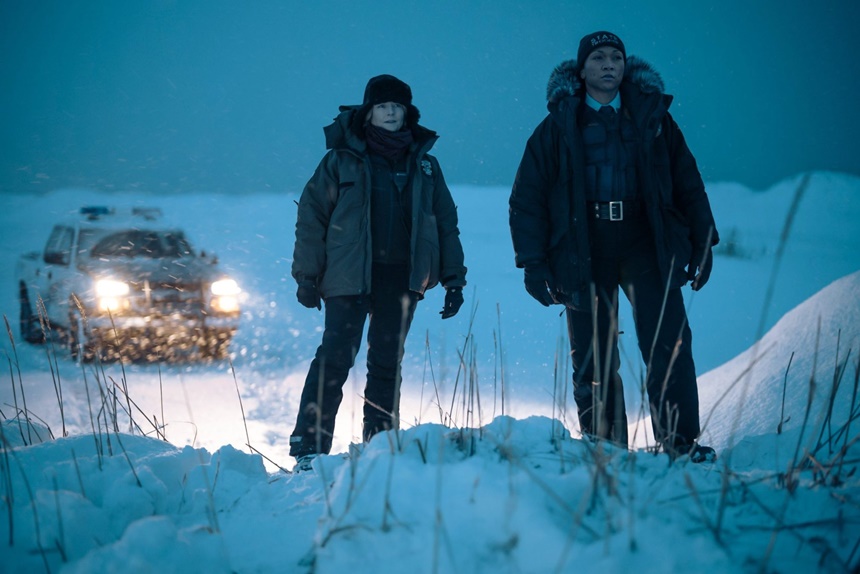True Detective: Night Country
⭐️ ⭐️ ⭐️ ⭐️
Run Time: Six Episodes
Stars: Jodie Foster, Kali Reis, Finn Bennett, Isabella LaBlanc, John Hawkes
Writers: Issa López, Alan Page
Director: Issa López
Streaming on HBO Max
It’s not unusual for states and cities to subsidize local filmmaking, but I’m willing to bet Alaska’s tourist board had nothing to do with the production of True Detective: Night Country, a brilliantly acted, moodily directed six-episode miniseries that depicts the 49th state as mired in a perpetual midnight of alcoholic loners, murderous corporate corruption…and creepy, hollow-eyed spirits of the recently departed.
Jodie Foster, fresh from her Oscar-nominated turn in last year’s NYAD, stars as Liz Danvers, the reluctant police chief of Ennis, a fictional mining town north of the Arctic Circle. It’s almost Christmas, which in the Lower 48 signifies a season for merriment, but in Ennis announces the arrival of a long, claustrophobic, subzero night.
Indeed, haphazardly strung holiday lights provide the only hint of festivity in Ennis, where the darkness seems to magnify the smoldering hostilities that persist among the chief local factions: The indigenous Iñupiat people, who accuse a mining company of destroying their historic land; the miners, who haughtily claim their jobs bring much-needed money into the community; and the town’s assemblage of various misfit immigrants, each of whom have come to the far north to escape whatever problems bedeviled them down south.
Everyone in Ennis, it seems, endures life against a persistent background noise of misery. But of all the people who don’t want to be in Ennis, Chief Danvers doesn’t want to be there the most. Exiled to this remote district by a rival superior back in Anchorage, she cruelly bullies her subordinates, including a fresh-faced young deputy (Finn Bennett) and his resentful veteran cop father (Winter’s Bone Oscar nominee John Hawkes). A widowed single mom, she forbids her teen daughter, Leah (Isabella LaBlanc), to explore her Iñupiat heritage. And she shares a dark secret with Evangeline Novarro (Kali Reis), a troubled Iñupiat state trooper, arising from a domestic abuse call gone horribly awry.
Danvers drinks herself to oblivion with some regularity and seems to have bedded 80 percent of the men in Ennis. But through her haze of detachment, she becomes obsessed with a strange local case: A group of scientists from a local research lab have been found on the Arctic ice, dead. But not just dead: The five of them are frozen into a solid mass of twisted, naked bodies, their eyes and mouths wide open in terror, their clothes nearby, stacked and neatly folded.
Danvers has the frozen assemblage (she calls it a “corpsesicle”) cut out of the ice and transported to a local hockey rink to thaw, in preparation for autopsies. As the ice melts away, over the course of a few episodes, more of the grisly tableau is exposed. Danvers becomes convinced that this is a case of murder most bizarre.
What’s more, Trooper Navarro is absolutely certain the strange case is linked to the murder of a young Iñupiat woman several years earlier.
Importantly, overlaying all this temporal agitation is the seeming presence of any number of Iñupiat ancestors who pop up unexpectedly — often inconveniently — with silent but eloquent messages for the living.
“The nights are so long here,” one Ennis resident observes, “even the dead get bored.”
Writer/director Issa López — a noted maker of Mexican horror films — lays on a glacier-thick layer of creepiness to the proceedings, creating a landscape where unspeakable horror can lurk in the inky shadows beyond the pitifully inadequate illumination of streetlights and holiday strands — and almost certainly does.
In her first-ever adult TV role — a reminder of just how long the 61-year-old star has been a big-screen icon — Foster’s diminutive frame swallows the screen. Her hangdog detective, a lost soul who just might have found a reason to see a world beyond her own personal misery, draws us into her self-imposed alienation. Reis, last seen as an iron-willed boxer in 2021’s Catch the Fair One, proves to be the kind of actor who conveys an encyclopedia of information in a deceptively blank stare: When a nearly dead character rises from his bed, points a finger at her and croaks, “Your mother says hello,” you don’t need to know the woman’s backstory to understand Mom hasn’t been among the living for a while.
Six episodes, roughly an hour each, should be enough to tie up the hydra of loose ends — both natural and supernatural — that bedevil the characters of Night Country. Frustratingly, Lopez either refuses or neglects to answer some of the series’ most vexing puzzles, including more than a few that drive the narrative from the very first episode.
Still, it’s a minor complaint. True Detective: Night Country is as much a tone poem as a thriller; a reminder that most of life’s mysteries, even when supposedly solved, leave too many questions unanswered.
Become a Saturday Evening Post member and enjoy unlimited access. Subscribe now



